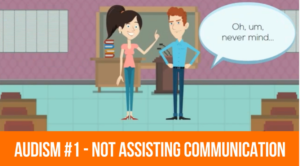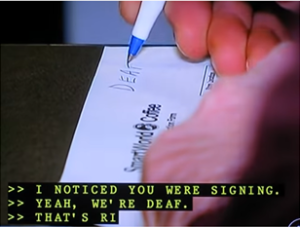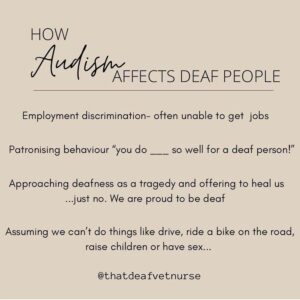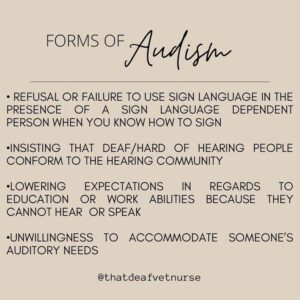If someone asked you what does audism mean? Would you know what audism is? If you knew what it is, how would you define the term audism?
Typing into Google “what is audism” this was the first thing to come up for me describing audism as, “a term used to describe a negative attitude toward deaf or hard of hearing people. It is typically thought of as a form of discrimination, prejudice, or general lack of willingness to accommodate those who cannot hear” (verywellhealth, 2020).
Typing the same thing into YouTube I came across this video. https://www.youtube.com/watch?v=FOnFFvb7ojs (5 Signs of Audism) which shows 5 simple examples of what audism is maybe without you even realising it. They describe the term of audism as “discrimination or prejudice against individuals who are deaf or hard of hearing.” (Ai-Media, 2016). In the video they explain the five signs of audism through conversations listed below and audism sometimes it makes way into everyday conversations in the community within deaf culture. The tips from the video as seen below shows that it can be found in different ways in society.
“Audism #1 – Not Assisting Communication”.

“Audism #2 – Assuming Deaf/HOH Can’t Do Things”.
“Audism #3 – “Thinking Deafness Is A Tragedy”.
“Audism #4 – “Patronizing Deaf/HOH Abilities”.
“Audism #5 – Employment Discrimination” (Ai-Media, 2016).
Saying never mind in conversations after they have asked you what you said (#1). Assuming and questioning they can’t drive or get a job but when given the opportunity to do these things they can do these like hearing people can (#2). Asking them if they are deaf and then apologising and thinking being deaf is a tragedy (#3). Saying they speak well for a deaf person when they are speaking to people (#4). Saying to them that they can’t do certain jobs or career just because they’re deaf (#5). Are all signs of audism.

With more research I came across another video through YouTube which shows audism through conversation. In February 2011 there was a show aired in American called ‘What Would You Do?’.https://www.youtube.com/watch?v=uqI1d4rLWSM
In the episode the manager (was pretending and the deaf applicants knew this, but the public didn’t) was refusing to let the two deaf women to let them fill out applications to work at the coffee shop. The male manger even writes the word “deaf” on the application form (see picture to side). We can see there is audist attitudes through the way the manager is refusing to hire them just because they’re deaf.
The definitions of audism by deaf scholars –
There are terms of Audism written by deaf scholars Tom Humphries and Harlan Lane. Humphries in 1977 described the term as “The notion that one is superior based on one’s ability to hear or to behave in the manner of one who hears.” (verywellhealth, 2020).
However, Harlan Lane another deaf scholar through Canadian Association of the Deaf and defined it as “Seizing control over deaf people – “Hearing people have enormous control over the lives of Deaf people.” (Canadian Association of the Deaf, 2015), later stating that “the assumption or belief that people who are deaf must be encouraged (or even forced) to become as much like non-deaf people as possible. The other is to assume control over deaf people, to disempower them, by making decisions about their language(s), their education, the services they will need, and so on, with limited or no input by the D/deaf person and the Deaf community.” (Canadian Association of the Deaf, N.D).

Doing more research from the statement above, I came across an article called “Audism: A Theory and Practice of Audiocentric Privilege by Eckert and Rowley (2013), which mentions a part of Lane’s book (1992) from page 43 saying that, ‘‘the corporate institution for dealing with deaf people, dealing with them by making statements about them, authorizing views of them, describing them, teaching about them, governing where they go to school, and in some cases where they live; in short, audism is the hearing way of dominating, restructuring, and exercising authority over the Deaf Community’’ (Eckert and Rowley 2013, page 106).
Audism can be also seen as “inappropriate, negative, or lower expectations of success held by some educators, administrators, audiologists or speech therapists, interpreters, corporate/business employees, or others in professional positions toward Deaf or hard of hearing people;” (Deaf Choice, N.D).
How would you feel if you couldn’t make decisions about your life? It would affect you a lot especially your well-being and mental health. The statements show that hearing people made the decisions for deaf people and told them what they can and can’t do, which is audism even if the person realised it or not.
Linking Audism to deaf culture –
There is a term within Audism called, ‘Audist’ which means that people “have knowledge of deaf culture but choose, for one reason or another, to ignore of defy it” (verywellhealth, 2020) and also “calling someone an audist would be the same as calling someone a racist” (Deaf Choice, N.D). It’s not just hearing people who can have this attitude deaf people can also have the same attitude maybe without realising too.
Deaf Choice also mentions that some deaf or hard of hearing people might feel that their views of language and the ability to use speech to communicate and their attitude makes them higher up. Deaf people might also “feel audists are attempting to destroy or oppress deaf culture.” (Deaf Choice, N.D). People have also found audist attitudes written in books, plays and in written poetry.
Audism can affect the deaf community and culture face this everyday this can be through “the form of communication barriers, discrimination, or hostile attitudes. Like other forms of oppression, audism prevents deaf and hard of hearing people from achieving their true potential. The consequences of audism include language deprivation, isolation, and widespread poverty, among others.” (HSDC, 2019). As well as these points it can also affect their education, jobs, their careers, living situation and event their mental health and their well-being.

Social Media is a big influence with bringing awareness to the deaf community and topics such as audism within the deaf community all the time and especially during Deaf Awareness Week. On Instagram, I saw a post by a lady called Meghan (@thatdeafvetnurse) https://www.instagram.com/p/CON25ZLHx2J/who’s vet nurse. Her post “What is Audism AND HOW IT AFFECTS DEAF PEOPLE” which was posted for this year’s Deaf Awareness Week (2021).

Having visual posts like this one (see to the side) on social media brings awareness to things that can affect deaf people and also help hearing and also deaf/hard of hearing people to understand and bring awareness to what Audism is and hopefully the discrimination, negative behaviours, and assuming things will happen less and less if we carry on explaining and bringing awareness to these things.
References
Ai-Media (2016), 5 Signs of Audism. https://www.youtube.com/watch?v=FOnFFvb7ojs (accessed 7th May 2021)
Berke, J. (2020). The Meaning and Practice of Audism. Available: https://www.verywellhealth.com/deaf-culture-audism-1046267#:~:text=Audism%20is%20a%20term%20used,accommodate%20those%20who%20cannot%20hear.. (Last accessed 7th May 2021.)
Canadian Association of the Deaf. (2015). Audism. Available: http://cad.ca/issues-positions/audism/. (Last accessed 8th May 2021).
Deaf Choice. (N.D). What is Audism. Available: https://deafchoice.com/faq/#toggle-id-3. Last Accessed 8th May 2021.
Eckert, R & Rowley, A. (2013). Audism: A Theory and Practise of Audiocentric Privilege. Available: https://journals.sagepub.com/doi/full/10.1177/0160597613481731 (Last Accessed 8th May 2021.)
HSDC. (2019). Addressing Audism . Available: https://www.verywellhealth.com/deaf-culture-audism-1046267#:~:text=Audism%20is%20a%20term%20used,accommodate%20those%20who%20cannot%20hear.. Last accessed 10th May 2021.
SC (2011). Deaf Discrimination on ABC’s “What Would You Do?”. Available: https://www.youtube.com/watch?v=uqI1d4rLWSM (Last Accessed 8th May 2021)
Wheadon, S. (Sheila). (N.D). No Audism and Audism (Pinterest Post). Retrieved 10th May 2021, from https://www.pinterest.co.uk/pin/90775748725372017/